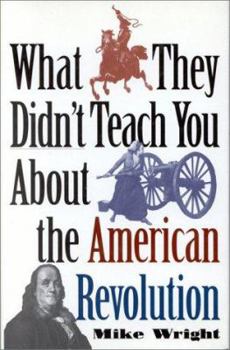What They Didn't Teach You about the American Revolution
Select Format
Select Condition 
Book Overview
What made the founding fathers so great (Or were they?). And don't forget the founding mothers. We have intrigue and skulduggery with spies from Nathan Hale to Benedict Arnold, including enlightening... This description may be from another edition of this product.
Format:Hardcover
Language:English
ISBN:0891416684
ISBN13:9780891416685
Release Date:June 1999
Publisher:Presidio Press
Length:368 Pages
Weight:1.25 lbs.
Dimensions:1.4" x 5.8" x 8.8"
Customer Reviews
3 ratings
More Interesting Essays
Published by Thriftbooks.com User , 22 years ago
This book is a series of essays on parts of history that are skipped over in the schoolbooks. He repeats the claim that only "one third" wanted to separate from Britain (p.xii). Can this ever be true then or now? I would estimate that about 3 out of 4 would be a more realistic figure (from what I read about other countries). John Adams history of the Revolution was flawed by his notoriously bad memory (p.293). Or the way he wanted to remember it?It tells how the Stamp Act resulted in the colonies forming a Congress and asking for its repeal, a direct tax. Americans did not have the gold and silver to pay the stamp duty (p.30). They raised their own food, and bartered; they could not print paper money.On p.60 he says there is no "Butcher's Hall" on the site of the Boston Massacre (as depicted in Paul Revere's engraving)! Isn't that a symbol for the British barracks?On p.64 he claims that a "guinea" is a pound (it is 21 shillings), and only worth about $1.35! That's way too low! Compare the price of homes, wages, etc. to find out its worth then. Page 82 repeats this mistake in currency evaluation ("$81"). Page 101 tells of Tom Paine's suggested old age pension of "ten pounds a year"; that would make their pound worth about $1000. He also mentions a great increase in the poor before the revolution, but doesn't go into the cause.Tradition tells of suffering, starvation, and death at Valley Forge (p.205). A National Park Service survey in the 1970s claimed differently; each month the 10,000 man army received a million pounds of flour, and a million pounds of meat and fish (3 pounds each a day). Surely the tradition is correct, and not the paper figures. But the winters in Morristown NJ were worse.He notes that 18th century usage of words differs from the 20th century meanings. I read that "well-regulated" then meant "well-trained" or "well-practiced".Chapter 8 discusses the East India Company's near bankruptcy in 1771. It got a government monopoly in the American market; no one could buy from any other source. This resulted in a 50% rise in price! Americans refused to buy it; in New York and Charleston they threw the tea into the river, and the bay in Boston. This led to hoarding weapons and gunpowder in the country, and the Battles of Lexington and Concord when the British tried to seize these weapons (a violation of their Bill of Rights).Another factor was the Quebec Act, which extended Canada's southern boundary to the Ohio River. Forbidding emigration west of the Allegheny Mountains would prevent veterans of the French and Indian War from gaining their promised lands.But the closing of the port of Boston resulted in uniting the colonies; they sent food to Boston. Committees of Correspondence were created to communicate between the colonies. Then the First Continental Congress met in Philadelphia; we know the rest.The author tells how the military trainers had to explain the purpose of the actions (the big picture). And how
A reminder of what's important
Published by Thriftbooks.com User , 24 years ago
The author provides a contemporary read of many key events in the American Revolution. Highly readable for someone who needs a refresher in the American Revolution but doesn't want to dive into the conventional histories. It IS readable and occasionally jabs with some unexpected wit. Wright takes fresh and vivid looks at the Boston Massacre, Saratoga, Valley Forge, Thomas Jefferson and George Washington that puts events in their place and reminds us of our humanity. The format does jump around in time quite a bit but the Revolution is a complex canvas. Thank him for following our revolutionary personalities to their passings, an especially moving chapter. The book is warm and honest. You get to be the judge of the legend and reality. Like a small bag of potato chips, you are left wanting more on many key events, but you get the feeling Wright did his best. We were just lousy historians while we were fighting for our independence. There are some great tidbits and pointers for those of military interest (See the description of the Battle of Cowpens). Thanks to Mr. Wright for a lively revisit to the American Revolution
a fast read that grabs your attention and doesn't let go
Published by Thriftbooks.com User , 24 years ago
A fun read that breathes life into all the old stories and characters. Gathers information from a voluminous amount of sources, and clarifies various bits of detailed information that was only hinted at before. The book also de-bunks some of the ongoing myths about the war. The only problem I had with it, was that there were a few chronological jumps that were disorienting. All in all, an easy read for all. I couldn't put it down.





